Module 8 Unit 1 I can hardly believe we are in the city centre 课件(47张)
文档属性
| 名称 | Module 8 Unit 1 I can hardly believe we are in the city centre 课件(47张) | 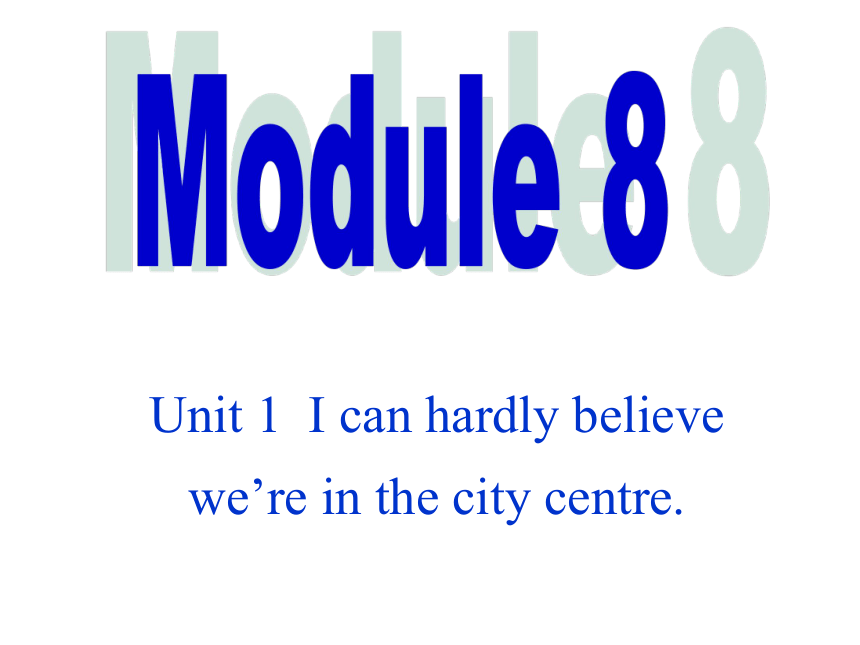 | |
| 格式 | zip | ||
| 文件大小 | 3.9MB | ||
| 资源类型 | 教案 | ||
| 版本资源 | 外研版 | ||
| 科目 | 英语 | ||
| 更新时间 | 2017-08-14 23:01:28 | ||
图片预览


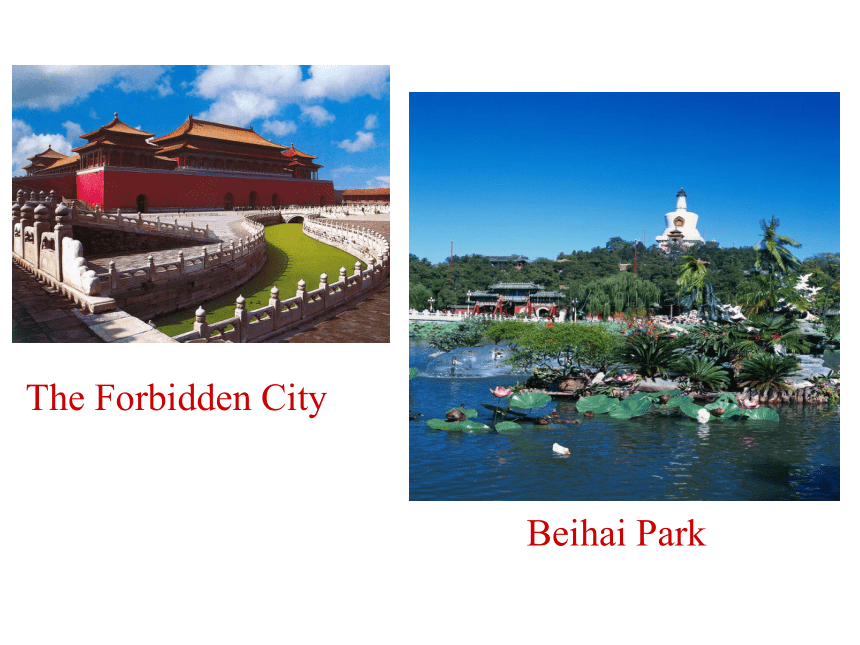
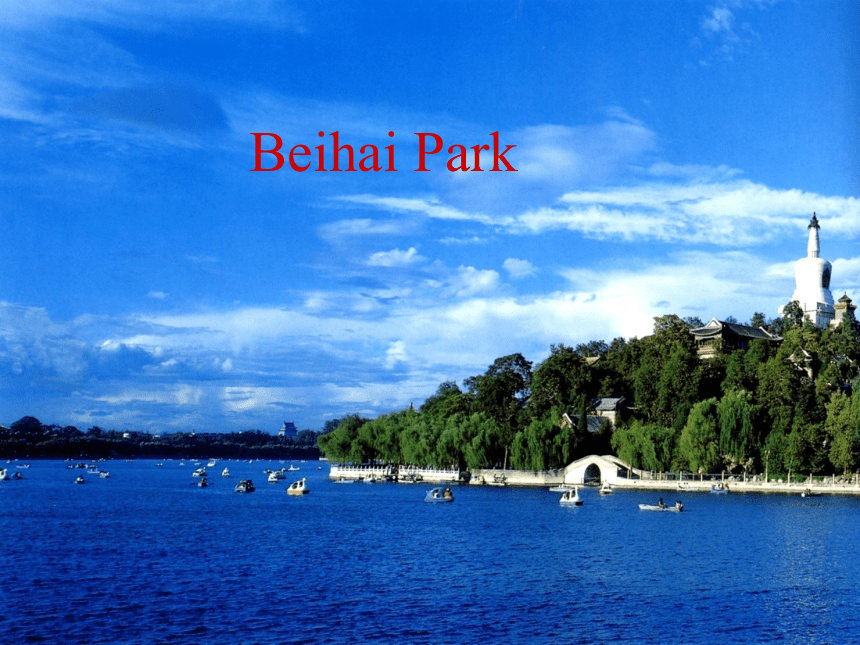
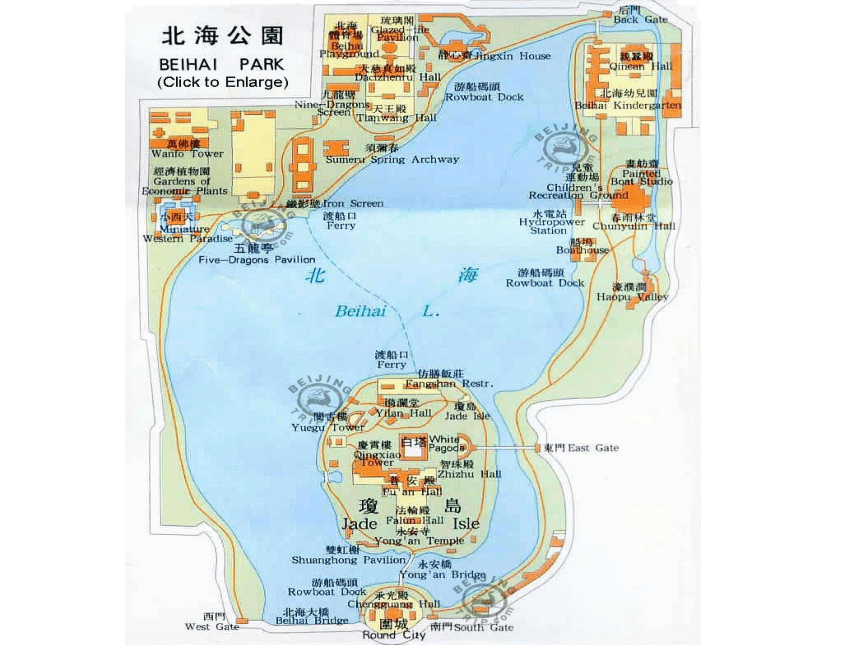
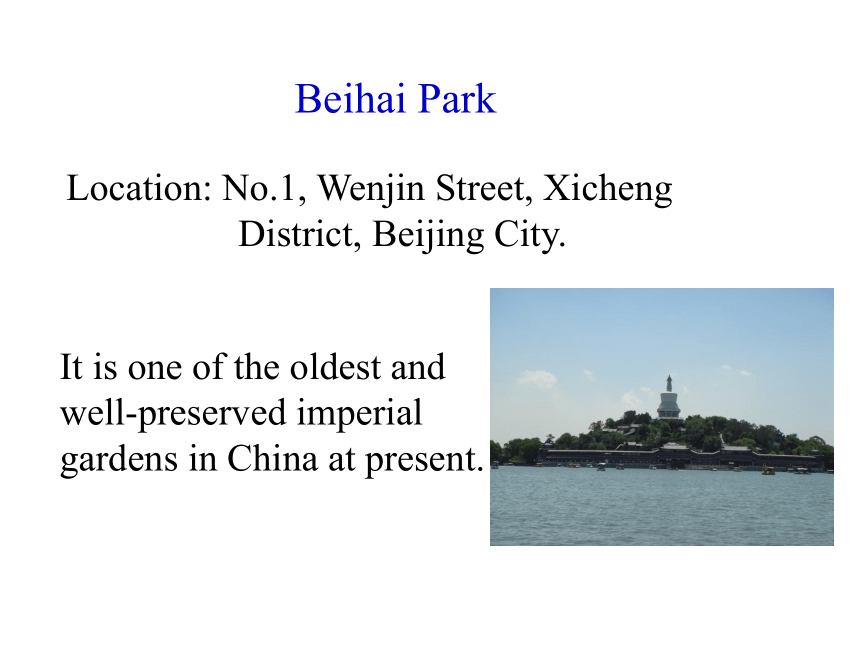
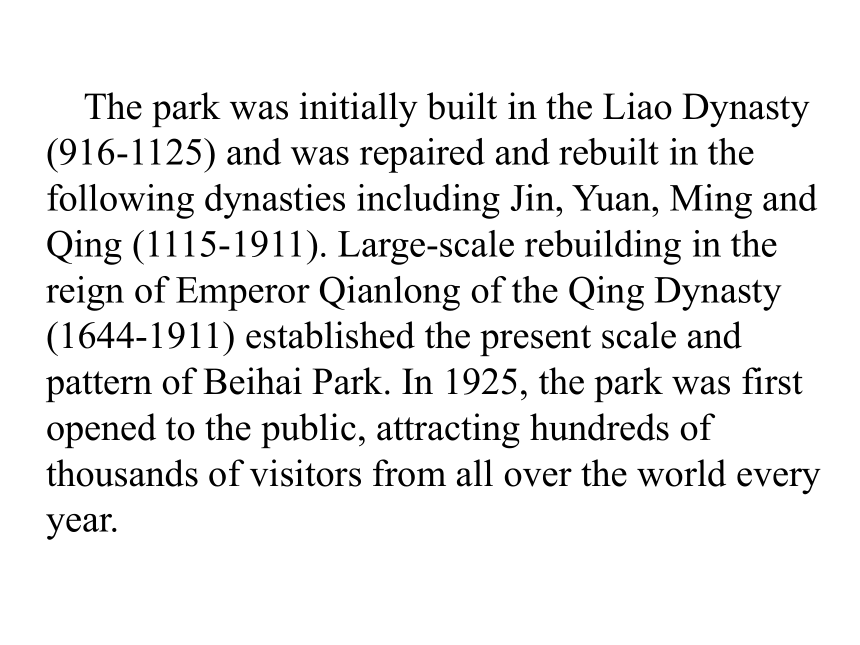
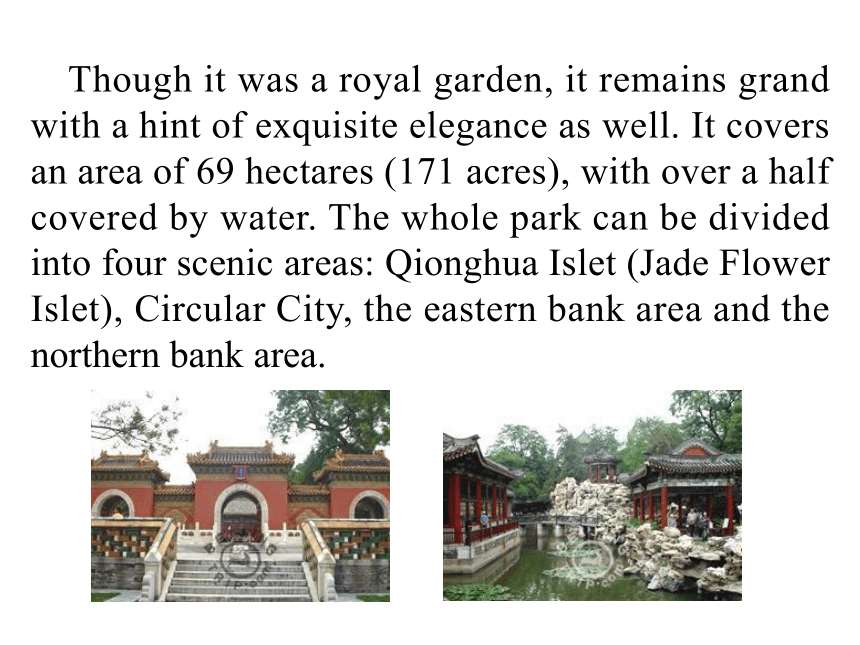
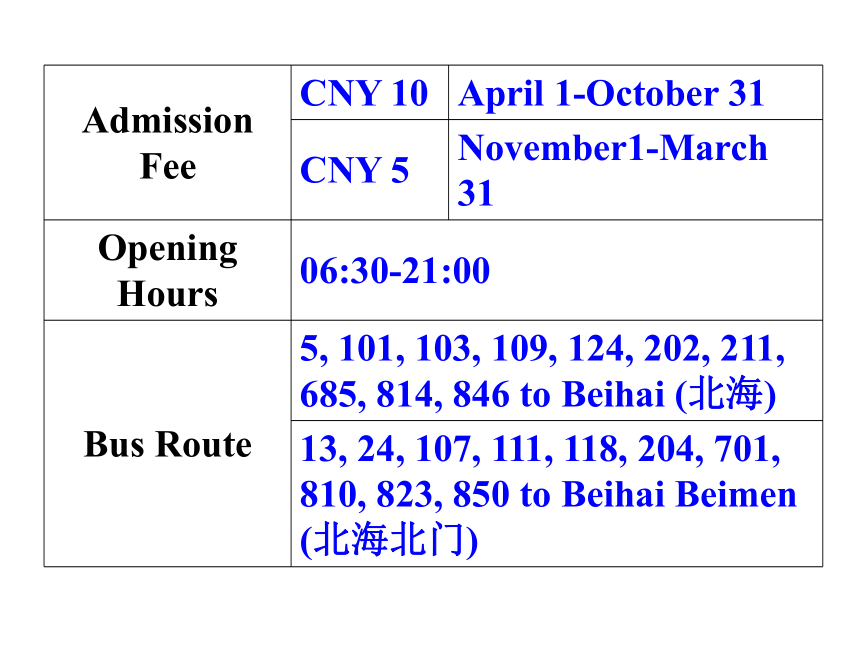
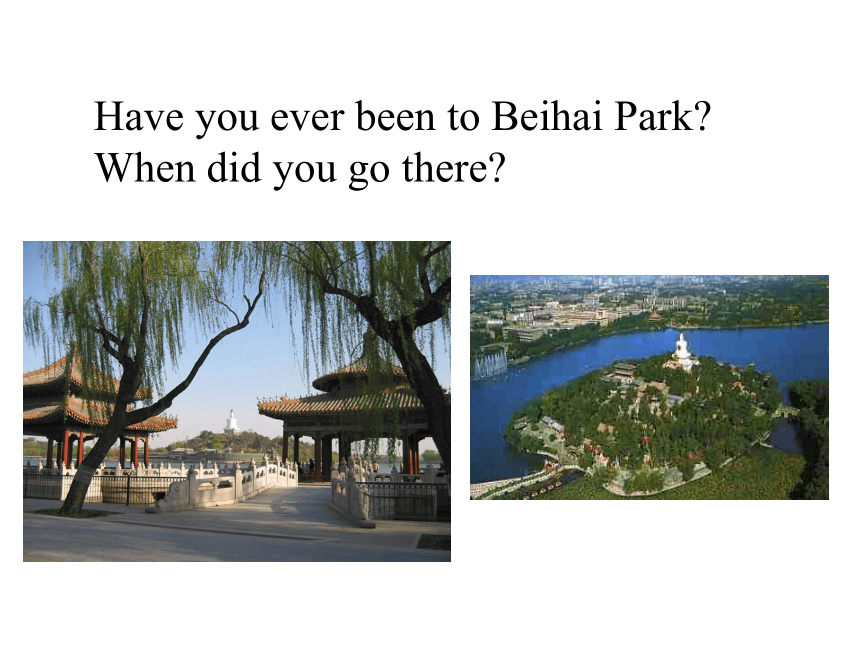

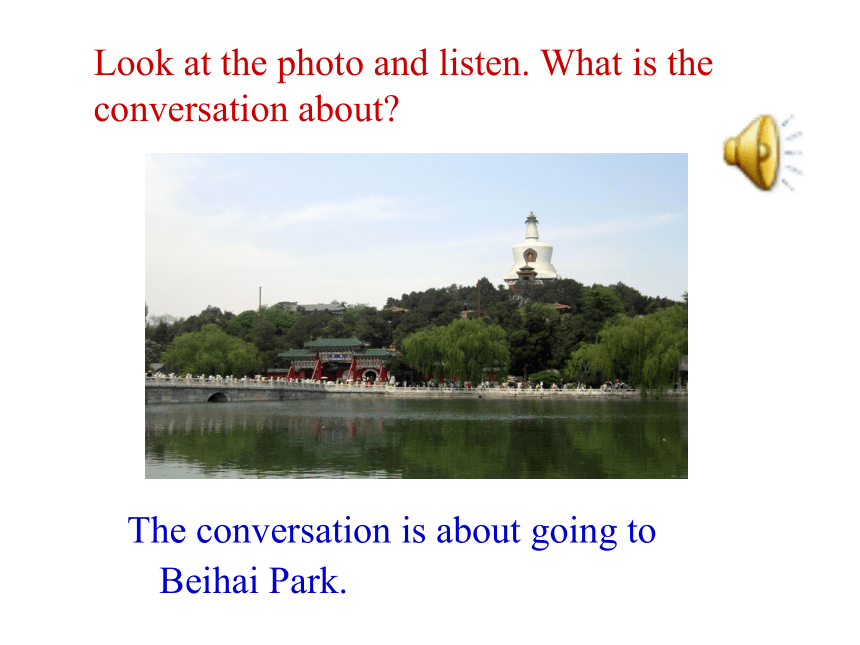
文档简介
课件47张PPT。Unit 1 I can hardly believe we’re in the city centre.Module 8Tian’anmen SquareThe Great WallWulingyuan Scenic and Historic Interest AreaDiscuss where you like to go when you have time off.Beihai ParkThe Forbidden CityBeihai ParkBeihai ParkLocation: No.1, Wenjin Street, Xicheng
District, Beijing City.It is one of the oldest and well-preserved imperial gardens in China at present. The park was initially built in the Liao Dynasty (916-1125) and was repaired and rebuilt in the following dynasties including Jin, Yuan, Ming and Qing (1115-1911). Large-scale rebuilding in the reign of Emperor Qianlong of the Qing Dynasty (1644-1911) established the present scale and pattern of Beihai Park. In 1925, the park was first opened to the public, attracting hundreds of thousands of visitors from all over the world every year. Though it was a royal garden, it remains grand with a hint of exquisite elegance as well. It covers an area of 69 hectares (171 acres), with over a half covered by water. The whole park can be divided into four scenic areas: Qionghua Islet (Jade Flower Islet), Circular City, the eastern bank area and the northern bank area.Have you ever been to Beihai Park? When did you go there? We can
We can see go boatingclimb the Baita go for a walk go sightseeing beautiful flowersferry clear waterdifferent kinds of boatsThe conversation is about going to Beihai Park.Look at the photo and listen. What is the conversation about?Listen again and choose the correct answer.Tony has / hasn’t heard about Beihai Park.
Tony guesses that the park is very popular / not very popular.
Lingling suggests that they spend the day there / Daming and Betty come to.
Lingling thinks / doesn’t think …A: I’ve heard that ___________ is very beautiful.
B: Yes, it is. Shall we _______________ there?
A: That’s a great idea. Maybe Daming and Betty will come, too.Read the conversation and fill in the blanks. go for a walk Beihai Park B: Let’s tell them that we’re going to ______ the day there.
A: I guess it’s a very ________ place. Will there be lots of people there?
B: Well, lots of people go there, but it’s a big park, so I don’t think it’ll be very ______.
A: I hope not. popular spendbusy1. What is Beihai Park famous for?2. Where are they have a picnic?At the top of the hill.This park is famous for its lake, bridges and ancient building on the hill.Listen to the conversation and answer the questions.3.Where are Lingling, Tony and Daming?
4.How does Tony feel about the park?
They’re in Beihai Park. It’s so quiet. He can even hear the birds singing.5. Why does Daming want to climb the hill?Because he is so tired and the weather is so hot.Read and complete the sentences about Beihai Park.1. Beihai Park is so __________ that you can even hear the birds singing.
2. The park is famous for its ______, bridges and the ancient building on the hill.
3. The lake takes up of the park area.
4. You can point out the _______ of Beijing from the top of the hill.
5. They do not allow people to swim
.quietlakeover halfsightsin the lakeRead again and answer the questions.1. I can hardly believe we’re in the city centre.Does Tony think they are in the city centre or not?Tony doesn’t think they are in the city centre.2. Then I can point out the sights of Beijing for you.Does Lingling want them to look at something or listen to something?Lingling wants them to look at something.3. I’m so hungry and thirsty.Does Daming want something to drink?Yes, he does.4. Let’s not waste any more time.Does Tony think they are spending their time well or badly?Tony thinks they are spending their time badly.Language points time off 意思是“( 正式规定的)休假或放假”。如:
If you are feeling tired, you should
take some time off.
Will you mind if I have some time off?
表示“休/ 请多长时间的假”则用:
have … off / take … off
We have / take three days off.
ask for … leave 表示“请多长时间的假”
He was ill, so he asked for two days’ leave. welcome (sb.) to ... 欢迎某人进入...
Welcome to our school.
Welcome home.
welcome也可以作名词, “欢迎”。
give visitors a warm welcome
receive a cold welcome
别人说thank you 或thanks时,可以用You are welcome.来回答。 hardly adv.“几乎不,仅仅”,含有否定的意味,放于be 动词或助动词之后、行为动词之前。如: It was so dark that I could hardly see anything.
The old people can hardly speak English.
I haven’t seen her for years but she has hardly changed at all.辨析:hard、hardly1、hard可用作形容词或副词。用作形容词时意为“困难的,硬的,勤奋的,严厉的,苛刻的”;用作副词时,意为“努力地,猛烈地,剧烈地”。
2、hardly是副词,意为“几乎不”,多和can连用,接近almost not,也可表示“几乎没有”的意思,和any连用时,相当于almost not。nearly几乎 hard; hardly; nearly; almost
It rained ________.
I can _______ believe my eyes. He is here.
She worked _______ late.
_________ no one takes any rest.
She drank _______ ten cups of tea. hard hardly hardAlmost nearly take up
(1)占,占去(时间;空间)
That big table takes up too much room.
Learning English takes up a lot of my time.
(2)开始从事
He had studied Japanese for a year before he took up English.
We took up chemistry at college. [Practice]When ____ he _________ football?
The work _________________ time. 1. 他是什么时候开始踢足球的?2. 那工作花费了他所有的时间。 did take up took up all hisAfter studying in a medical college for five years, Jane ______ her job as a doctor in the countryside.
A. set out B. took over
C. took up D. set up
答案: C point out 指出,说明;使注意到 Did he point out where you were wrong?
He points out our shortcoming(缺点). We will correct them.
Point out the mistake in this sentence, please. point to和point at都有“指向”之意,有时可以互换。
①point to多指较远距离的事物,to着重于指方向,主语既可以是人,也可以是物;
②point at多指向较近距离的事物,at着重于指的对象,其主语通常是人;但point … at是“瞄准 …”之意;
③point out是“指出…”之意,out是副词。[辨析] point at, point to, point out 1). Don’t _________ the words while you are reading.
2). As he started the operation, the hour hand of the clock __________ 9.
3). The teacher ___________ many mistakes in my homework.
4). Will you please __________ the man who saved the boy’s life?
5). They ________ their guns ____ her head, but she was not afraid.point atpointed outpoint outpointed topointedat[Practice] Why don’t … do …?
= Why not do…?
“为什么不…?” 。如:
Why don’t you come earlier?
Why not go earlier?1). --- ________ come and join us in the game?
--- Id like to. But I must go to meet Mr. Smith at the airport.
A. Why not B. Why don’t
C. Why not to D. Why
【答案与解析】很显然这是对 why not do …和 why don’t you do sth. 句型的考察,这里用排除法很容易就能排除 B 项,缺少主语 you;排除 C 项,不需要加 to;排除 D 项,缺少 not;所以选 A。[Practice]2). -Why not come and join us in the game?
-________. But I must go to meet Mr.
Smith at the airport.
A. I’d like to B. Let’s go
C. Yes, please D. It’s a pleasure
【答案与解析】 本题考察Why not do ...句型的回答。根据句意:---来参加我们的比赛,怎么样? ---我想去,但是我必须去机场接 Smith 先生。不难看出应该选择 A。其他的选项不符合句意。[Practice]Read and practice the conversation with your partners.
Make a new conversation. Pronunciation and speaking Listen and notice how the speaker pronounces the words.It’s so quiet here that I can even hear the birds singing.
Let’s walk along the lake, cross the bridge and climb up the hill.
I don’t want to climb.Student A: You’re a visitor from another country.
Student B: You’re introducing a place of interest in your home town to student A. You can talk about:Work in pairs. Take about a place of interest in your home town.Where it is
How big it is
How old it is
What is special about it
Any other information you know about itUse the expressions:
I guess (that) …
I know (that) …
I think (that) …
I’m sure (that) …
I can’t believe (that) …同步练习 hear about welcome to hear the birds singing be famous for take up walk along the lake cross the bridge point out 允许某人做某事 在山顶1. It’s raining ________ (hard) outside.
2. I heard Lucy __________(sing) when I walked past her room.
3. Why don’t we _____(go) for a walk?
4. They don’t want _________(climb) the mountain.
5. I’m so _________(tire) that I stopped
_______(take) a break.
6. I can __________(hard) believe we’re
in the city centre. hard singing go to climb tired to take hardly1. 每天早上,我都能听见同学们在大声读书。
Every morning I can ____________________ loudly.
2. 妈妈叫他不要喝太多。
Mother asked him ______________________ .
3. 老师问我是否对舞蹈感兴趣。
The teacher asked me ___________________ dancing. hear my classmates read books not to drink too much if / whether I was interested in谢谢!
District, Beijing City.It is one of the oldest and well-preserved imperial gardens in China at present. The park was initially built in the Liao Dynasty (916-1125) and was repaired and rebuilt in the following dynasties including Jin, Yuan, Ming and Qing (1115-1911). Large-scale rebuilding in the reign of Emperor Qianlong of the Qing Dynasty (1644-1911) established the present scale and pattern of Beihai Park. In 1925, the park was first opened to the public, attracting hundreds of thousands of visitors from all over the world every year. Though it was a royal garden, it remains grand with a hint of exquisite elegance as well. It covers an area of 69 hectares (171 acres), with over a half covered by water. The whole park can be divided into four scenic areas: Qionghua Islet (Jade Flower Islet), Circular City, the eastern bank area and the northern bank area.Have you ever been to Beihai Park? When did you go there? We can
We can see go boatingclimb the Baita go for a walk go sightseeing beautiful flowersferry clear waterdifferent kinds of boatsThe conversation is about going to Beihai Park.Look at the photo and listen. What is the conversation about?Listen again and choose the correct answer.Tony has / hasn’t heard about Beihai Park.
Tony guesses that the park is very popular / not very popular.
Lingling suggests that they spend the day there / Daming and Betty come to.
Lingling thinks / doesn’t think …A: I’ve heard that ___________ is very beautiful.
B: Yes, it is. Shall we _______________ there?
A: That’s a great idea. Maybe Daming and Betty will come, too.Read the conversation and fill in the blanks. go for a walk Beihai Park B: Let’s tell them that we’re going to ______ the day there.
A: I guess it’s a very ________ place. Will there be lots of people there?
B: Well, lots of people go there, but it’s a big park, so I don’t think it’ll be very ______.
A: I hope not. popular spendbusy1. What is Beihai Park famous for?2. Where are they have a picnic?At the top of the hill.This park is famous for its lake, bridges and ancient building on the hill.Listen to the conversation and answer the questions.3.Where are Lingling, Tony and Daming?
4.How does Tony feel about the park?
They’re in Beihai Park. It’s so quiet. He can even hear the birds singing.5. Why does Daming want to climb the hill?Because he is so tired and the weather is so hot.Read and complete the sentences about Beihai Park.1. Beihai Park is so __________ that you can even hear the birds singing.
2. The park is famous for its ______, bridges and the ancient building on the hill.
3. The lake takes up of the park area.
4. You can point out the _______ of Beijing from the top of the hill.
5. They do not allow people to swim
.quietlakeover halfsightsin the lakeRead again and answer the questions.1. I can hardly believe we’re in the city centre.Does Tony think they are in the city centre or not?Tony doesn’t think they are in the city centre.2. Then I can point out the sights of Beijing for you.Does Lingling want them to look at something or listen to something?Lingling wants them to look at something.3. I’m so hungry and thirsty.Does Daming want something to drink?Yes, he does.4. Let’s not waste any more time.Does Tony think they are spending their time well or badly?Tony thinks they are spending their time badly.Language points time off 意思是“( 正式规定的)休假或放假”。如:
If you are feeling tired, you should
take some time off.
Will you mind if I have some time off?
表示“休/ 请多长时间的假”则用:
have … off / take … off
We have / take three days off.
ask for … leave 表示“请多长时间的假”
He was ill, so he asked for two days’ leave. welcome (sb.) to ... 欢迎某人进入...
Welcome to our school.
Welcome home.
welcome也可以作名词, “欢迎”。
give visitors a warm welcome
receive a cold welcome
别人说thank you 或thanks时,可以用You are welcome.来回答。 hardly adv.“几乎不,仅仅”,含有否定的意味,放于be 动词或助动词之后、行为动词之前。如: It was so dark that I could hardly see anything.
The old people can hardly speak English.
I haven’t seen her for years but she has hardly changed at all.辨析:hard、hardly1、hard可用作形容词或副词。用作形容词时意为“困难的,硬的,勤奋的,严厉的,苛刻的”;用作副词时,意为“努力地,猛烈地,剧烈地”。
2、hardly是副词,意为“几乎不”,多和can连用,接近almost not,也可表示“几乎没有”的意思,和any连用时,相当于almost not。nearly几乎 hard; hardly; nearly; almost
It rained ________.
I can _______ believe my eyes. He is here.
She worked _______ late.
_________ no one takes any rest.
She drank _______ ten cups of tea. hard hardly hardAlmost nearly take up
(1)占,占去(时间;空间)
That big table takes up too much room.
Learning English takes up a lot of my time.
(2)开始从事
He had studied Japanese for a year before he took up English.
We took up chemistry at college. [Practice]When ____ he _________ football?
The work _________________ time. 1. 他是什么时候开始踢足球的?2. 那工作花费了他所有的时间。 did take up took up all hisAfter studying in a medical college for five years, Jane ______ her job as a doctor in the countryside.
A. set out B. took over
C. took up D. set up
答案: C point out 指出,说明;使注意到 Did he point out where you were wrong?
He points out our shortcoming(缺点). We will correct them.
Point out the mistake in this sentence, please. point to和point at都有“指向”之意,有时可以互换。
①point to多指较远距离的事物,to着重于指方向,主语既可以是人,也可以是物;
②point at多指向较近距离的事物,at着重于指的对象,其主语通常是人;但point … at是“瞄准 …”之意;
③point out是“指出…”之意,out是副词。[辨析] point at, point to, point out 1). Don’t _________ the words while you are reading.
2). As he started the operation, the hour hand of the clock __________ 9.
3). The teacher ___________ many mistakes in my homework.
4). Will you please __________ the man who saved the boy’s life?
5). They ________ their guns ____ her head, but she was not afraid.point atpointed outpoint outpointed topointedat[Practice] Why don’t … do …?
= Why not do…?
“为什么不…?” 。如:
Why don’t you come earlier?
Why not go earlier?1). --- ________ come and join us in the game?
--- Id like to. But I must go to meet Mr. Smith at the airport.
A. Why not B. Why don’t
C. Why not to D. Why
【答案与解析】很显然这是对 why not do …和 why don’t you do sth. 句型的考察,这里用排除法很容易就能排除 B 项,缺少主语 you;排除 C 项,不需要加 to;排除 D 项,缺少 not;所以选 A。[Practice]2). -Why not come and join us in the game?
-________. But I must go to meet Mr.
Smith at the airport.
A. I’d like to B. Let’s go
C. Yes, please D. It’s a pleasure
【答案与解析】 本题考察Why not do ...句型的回答。根据句意:---来参加我们的比赛,怎么样? ---我想去,但是我必须去机场接 Smith 先生。不难看出应该选择 A。其他的选项不符合句意。[Practice]Read and practice the conversation with your partners.
Make a new conversation. Pronunciation and speaking Listen and notice how the speaker pronounces the words.It’s so quiet here that I can even hear the birds singing.
Let’s walk along the lake, cross the bridge and climb up the hill.
I don’t want to climb.Student A: You’re a visitor from another country.
Student B: You’re introducing a place of interest in your home town to student A. You can talk about:Work in pairs. Take about a place of interest in your home town.Where it is
How big it is
How old it is
What is special about it
Any other information you know about itUse the expressions:
I guess (that) …
I know (that) …
I think (that) …
I’m sure (that) …
I can’t believe (that) …同步练习 hear about welcome to hear the birds singing be famous for take up walk along the lake cross the bridge point out 允许某人做某事 在山顶1. It’s raining ________ (hard) outside.
2. I heard Lucy __________(sing) when I walked past her room.
3. Why don’t we _____(go) for a walk?
4. They don’t want _________(climb) the mountain.
5. I’m so _________(tire) that I stopped
_______(take) a break.
6. I can __________(hard) believe we’re
in the city centre. hard singing go to climb tired to take hardly1. 每天早上,我都能听见同学们在大声读书。
Every morning I can ____________________ loudly.
2. 妈妈叫他不要喝太多。
Mother asked him ______________________ .
3. 老师问我是否对舞蹈感兴趣。
The teacher asked me ___________________ dancing. hear my classmates read books not to drink too much if / whether I was interested in谢谢!
同课章节目录
- Module 1 Feelings and impressions
- Unit 1 It smells delicious.
- Unit 2 I feel nervous when I speak Chinese .
- Unit 3 Language in use
- Module 2 Experiences
- Unit 1 I've also entered lots of speaking competi
- Unit 2 They have seen the Pyramids.
- Unit 3 Language in use
- Module 3 Journey to space
- Unit 1 Has it arrived yet?
- Unit 2 We have not found life on any other planet
- Unit 3 Language in use
- Module 4 Seeing the docto
- Unit 1 I haven't done much exercise since I got m
- Unit 2 We have played football for a year now
- Unit 3 Language in use
- Module 5 Cartoons
- Unit 1 It's time to watch a cartoon.
- Unit 2 Tintin has been popular for over eighty yea
- Unit 3 Language in use
- Revision module A
- Module 6 Hobbies
- Unit 1 Do you collect anything ?
- Unit 2 Hobbies can make you grow as a person.
- Unit 3 Language in use
- Module 7 Summer in Los Angeles
- Unit 1 Please write to me and send me some photos
- Unit 2 Fill out a form and come to learn English
- Unit 3 Language in use
- Module 8 Time off
- Unit 1 I can hardly believe we are in the city ce
- Unit 2 We thought somebody was moving about
- Unit 3 Language in use
- Module 9 Friendship
- Unit 1 Could I ask if you've mentioned this to he
- Unit 2 I believe that the world is what you think
- Unit 3 Language in use
- Module 10 On the radio
- Unit 1 I hope that you can join us one day
- Unit 2 It seemed that they were speaking to me in
- Unit 3 Language in use
- Revision module B
